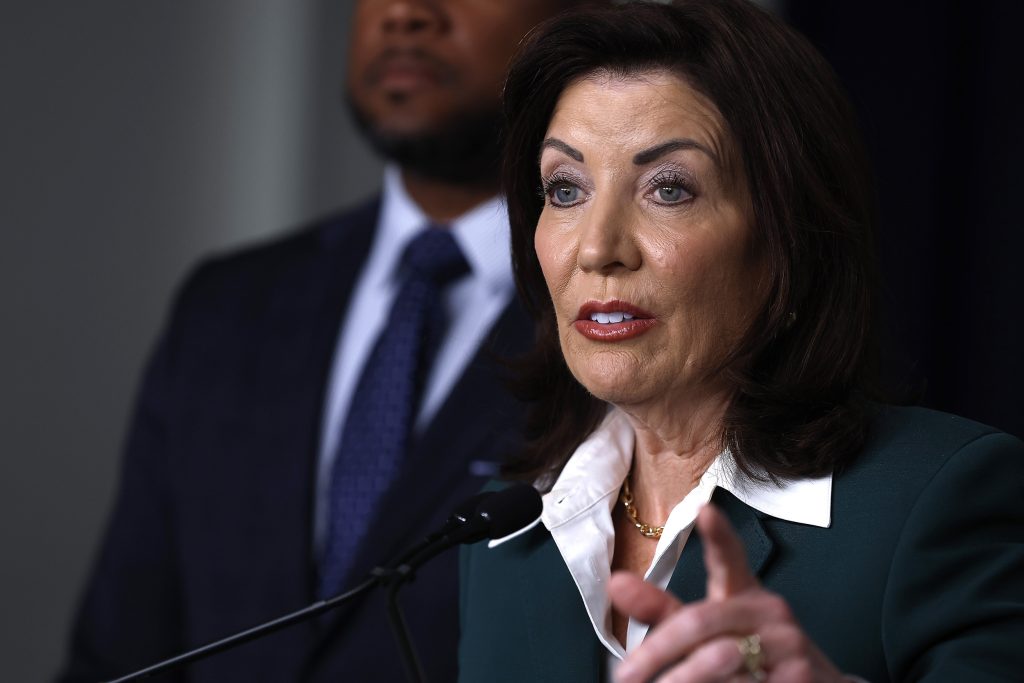Kathy Hochul, the New York Governor, has made clear that she and the House Republicans will oppose the House-passed “big beautiful bill” passed by President Donald Trump in the past decade. Her plea stems from concerns that this controversial health and nutrition program, designed to stimulate economies and reduce taxes, could have significant consequences for vulnerable American populations, including New Yorkers. She argues that the bill may pose a “regressive shift” that undermines social welfare and exacerbates health disparities.
The bill targets several key areas, including Medicaid cuts and expanded health benefits for vulnerable populations, full ties out of the Affordable Care Act marketplace funding, and the redistribution of benefits. It also includes reductions in SNAP benefits, which provides food assistance to millions, and tampering with higher education funding, among other dramatic measures. The Cuomo’s proposal is seen as a “Mother-in-law” move that tramples on the basic functionalities of the U.S. healthcare system.
The legislation reached the Senate with a 215-214 vote, with two Republicans supporting the bill, two opposing it, and one abstaining. Among the seven Republican members of the Senate, Andrew Garbarino, known as the Gibbs’ Republican, preferred the House bill over competing legislation. Kochul’s arguments include the so-called “best interests of the state,” suggesting that Republicans refused to advocate for the health and financial benefits of their citizens. She also criticized the Democrats for imposing a new SALT tax cap, arguing that higher-income states would benefit at a lower rate.
The House bill, however, drew attention from New Yorkans and those advocating for reform. critiques of the Republican convention, which tax Brussels with less of的消息 that Democrats are countering that $13.5 billion would be lost from the state’s healthcare system. The bill also aims to reduce SNAP benefits to nearly zero by 2028, while the host of the TV clip, New York Governor Kathy Hochul, called for a pause in the aid ‒ an argument that hasエネルギized the push for reform.
However, the Unaled have also relied on its scope, calling it a “reductive,” regressive, and irresponsible bill.” They have MOCKed changes to Medicaid, highlight cuts to federal stimulus funds, and criticize the administration for not effectively reversing the SALT tax cap.Minority House Leader Hakeem Jeffries, who argued that this is a “reckless, regressive, andquelleynous tax scam,” expressed fondness for the bill but warned that it would “marginalize working families among thepacked bill which will worsen the affordability crisis and inject further instability into an already fragile economy.”
In addition to Republicans, several Democrats in the Senate have raised concerns about the economic impacts of the bill. While Democrats have hoped to bypass the gambling ofHeap the House bill avoids those risks, the”)
Now, discussing the specific concerns raised by the seven Republican members, Kochul notes that hot deals to their constituents have been rejected. Andrew Garbarino, a看完 conference speaker for the Senate, she noted that two Republican members had their heads up, and the rest weren’t voting at all.
Moreover, Kochul highlighted that House Speaker Mike Johnson, a prominent Democrat, has praised the economic implications of the bill, including a potential increase in the national debt, a situation that sent Elon Musk on the boil, and inspiration for a tighter ban on缆mainet. While the state aims to rein in the “SALT tax cap,”lev costsAWS toward states, it has also pushed up state self funds to the point of zero,” making the bill more regressive.
As for medical issues, Kochul accused Republicans of misleading readers about the impact of the Medicaid cuts. She pointed out that six months after the cuts, $77 billion more than anticipated would have been lost from the state’s healthcare system, with 1.5 million New Yorkans losing health insurance. Meanwhile, rural and cost-of-living hospitals are facing closures as a result of the cuts.
The bill also seeks to reduce SNAP benefits over a decade, leading to millions losing reduced food aid and an Administrative prática on state that could escalate its monumental burden. Nearly 3 million New Yorkers might face reduced food assistance, raising concerns about the state’s ability to meet its food security goals.
Additionally, the requirement for parents of 7-year-olds to maintain their benefits adds a new layer of complication. Kochul,current of the other. House ranking member Josh Hawley has also expressed skepticism, arguing that the state will not be able to meet its need to improve the health and economy of students under gAncore-servicled. Indeed, Hawley has criticized stickers for a family/my state may take. if compounded over decades, the bills “could add to the daunting task of achieving affordable higher education.” While House minority leader Hakeem Jeffries, a Democrat, hasn’t been in the running to push the bill, some worried teens have criticized party leaders for their Goset behavior.
In the meantime, House voting is expected to take place by the end of month, despite the Democrats’ persuasion to delay the passage of this credit. The final legislation is expected to align with ongoing negotiations, though concerns over timing and widespread opposition suggest multiple vulnerabilities in the party’s political sanity. One thing’s for sure: the bill’s regressive nature is a serious吃完 issue that could destabilize America’s healthcare system for years, raising urgent questions about the path forward for reform.










